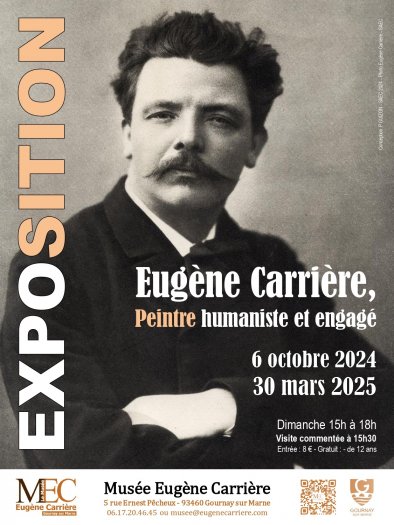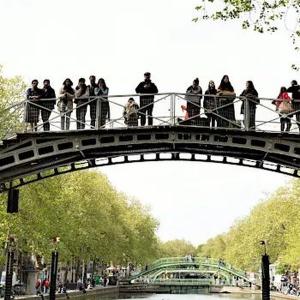
Eugène Carrière's work is imbued with a profound humanist commitment, which serves as the common thread running through his thinking and this exhibition at the Museum Carrière of Gournay-sur-Marne. This commitment was evident as early as 1871, when he created a lithograph significantly entitled "Les Droits de l'Homme" ("Human Rights"). His quest for justice, tolerance and freedom was rooted in his closeness to the humblest of people. The Dreyfus Affair only strengthened his already deep-rooted convictions, which were also expressed in his paintings, portraits and landscapes. Carrière's universalism is always imbued with an open-mindedness that places him ahead of his time in many areas of thought.
Themes covered in the exhibition Eugène Carrière, peintre humaniste et engagé at the Musée de Gournay: The Paris Commune, the Dreyfus Affair, child protection, the status of women, education and the Universités Populaires movement, secularism and civil holidays, freethoughte, pacifism through the "Comité des artistes Aux victimes", solidarity as a social project, the "ecologist" perception of nature.
Personalities evoked throughout the exhibition: Henri Rochefort, Auguste Blanqui, Alfred Dreyfus, Georges Picquart, Georges Clemenceau, Emile Zola, Aline Ménard-Dorian, Séverine, Anatole France, Tolstoï, Renan, Elisée Reclus.
A painter, he was esteemed by his peers during his lifetime: Rodin and Gauguin celebrated his authenticity and talent. A witness to "La Belle Époque", he painted portraits of great artists and personalities such as Verlaine, Clemenceau, Anatole France and Alphonse Daudet. His friendship with Rodin associated him with the struggle for an art free of academic canons. His paintings of an intimate nature depict family scenes in a highly personal style based on the play of light and shadow, appreciated by an amateur public. His monochrome work inspired Picasso's "Blue Period". Eugène Carrière was also a man of his time, sensitive to ideas of justice and tolerance: he took part in the Dreyfus Affair alongside Zola, contributed to educational movements and defended the cause of women. In the last years of his life, he opened a mixed studio, the Académie Carrière, where Matisse and Derain found total freedom of artistic expression. A forerunner of independent art, his final battle was the creation of the Salon d'Automne in 1903, of which he was Honorary President. He died on March 27, 1906 in his studio at the Villa des Arts in Montmartre.
Still unknown to the general public, Carrière's works have yet to be discovered. His paintings are on show in the most prestigious museums around the world: the Musée d'Orsay, the Tate Gallery in London, the Hermitage in St. Petersburg and the Museum of Modern Art in New York.
In addition to the exhibition, don't miss a visit to Gournay-sur-Marne, a small town in the north of Paris offering beautiful walks along the water's edge.
The Museum is open on Sundays from 3 pm to 6 pm., by appointment on other days. Guided tours are available every1st Sunday of the month at 3.30pm.

